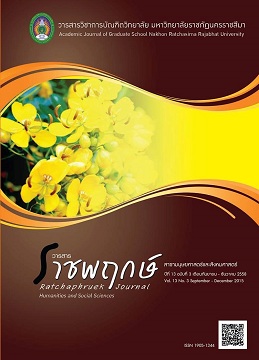ผลการสัมภาษณ์เพื่อสร้างแรงจูงใจแบบกลุ่ม ต่อพฤติกรรมสุขภาพและระดับคอเลสเตอรอล ของผู้ป่วยความดันโลหิตสูง
Main Article Content
Abstract
การวิจัยครั้งนี้มีจุดมุ่งหมายเพื่อศึกษาผลการสัมภาษณ์เพื่อสร้างแรงจูงใจแบบกลุ่ม ต่อพฤติกรรมสุขภาพและระดับคอเลสเตอรอลของผู้ป่วยความดันโลหิตสูง กลุ่มตัวอย่างคือ ผู้ป่วยความดันโลหิตสูง ที่มีภาวะคอเลสเตอรอลในเลือดสูง โดยมีคุณสมบัติตามที่ได้กำหนดไว้ในงานวิจัย จำนวน 16 คน สุ่มอย่างง่ายเป็นกลุ่ม 2 กลุ่ม ได้แก่ กลุ่มทดลองและกลุ่มควบคุม กลุ่มละ 8 คน เครื่องมือที่ใช้ในการวิจัย ได้แก่ แบบวัดพฤติกรรมสุขภาพและโปรแกรมการปรึกษาการสัมภาษณ์ เพื่อสร้างแรงจูงใจแบบกลุ่ม จำนวน 12 ครั้ง ครั้งละ 90 นาที ที่ผู้วิจัยสร้างขึ้น การรวบรวมข้อมูล แบ่งเป็น 3 ระยะ คือ ระยะก่อนการทดลอง ระยะหลังการทดลอง และระยะติดตามผล วิเคราะห์ข้อมูลด้วยวิธีการวิเคราะห์ความแปรปรวนแบบวัดซ้ำ และทดสอบความแตกต่างรายคู่ แบบบองเฟอโรนี
ผลการวิจัย พบว่า มีปฏิสัมพันธ์ระหว่างวิธีการทดลอง กับระยะเวลาของกาทดลองอย่างมีนัยสำคัญทางสถิติ (p<.05) ผู้ป่วยความดันโลหิตสูงในกลุ่มทดลองมีพฤติกรรมสุขภาพในระยะหลังทดลองและระยะติดตามผลสูงกว่ากลุ่มควบคุม อย่างมีนัยสำคัญทางสถิติ (p<.05) ผู้ป่วยความดันโลหิตสูงในกลุ่มทดลอง มีพฤติกรรมสุขภาพในระยะหลังทดลองสูงกว่าระยะก่อนทดลองอย่างมีนัยสำคัญทางสถิติ (p<.05) แต่ในระยะติดตามผลแตกต่างกันอย่างไม่มีนัยสำคัญทางสถิติผู้ป่วยความดันโลหิตสูงในกล่มุ ทดลอง มีระดับคอเลสเตอรอลในระยะหลังทดลองต่ำกว่ากลุ่มควบคุมอย่างมีนัยสำคัญทางสถิติ (p<.05) แต่ในระยะติดตามผลแตกต่างกันอย่างไม่มีนัยสำคัญทางสถิติ และผู้ป่วยความดันโลหิตสูงในกลุ่มทดลองมีระดับคอเลสเตอรอลในระยะหลังทดลองต่ำกว่าระยะก่อนทดลองอย่างมีนัยสำคัญทางสถิติ (p<.05) ส่วนในระยะติดตามผลแตกต่างกันอย่างไม่มีนัยสำคัญทางสถิติ
Effects of Motivational Interviewing Group Counseling in Health Behaviour and Level of Cholesterol of Hyperttesive Patients
The purpose of this research was to study the effects of motivational interviewing group counseling in health behavior and level of cholesterol of hypertensive patients. The sample consisted of 16 hypertensive patients with high level of cholesterol who qualified in this research criterion. The sample was randomly assigned into 2 groups; the experimental group and the control group, with 8 patients in each. The research instruments were the health behavior questionnaire and the 12 sessions of motivational interviewing group counseling program. 90 minutes was spent in each session, which were designed by the researcher. The data collecting procedure was divided into three phases: the pretest, the posttest, and the follow-up phases. The data were statically analyzed by utilizing a repeated measure analysis of variance and paired-different test by Bonferroni procedure.
The results revealed that the interaction between the experimental methodology and the duration of the experiment were found significantly (p<.05). The hypertensive patients in the experiment group demonstrated significantly higher health behavior score than those in the control group in both the posttest and the follow-up phase (p<.05).
The hypertensive patients in the experiment group demonstrated significantly higher healthbehavior score in the posttest phase than the pretest one (p<.05), but no significantly in the follow-up. The hypertensive patients in the experiment group demonstrated significantly lower level of cholesterol than those in the control group in the posttest phase (p<.05), but no significant was found in the follow-up phase. The hypertensive patients in the experiment group demonstrated at significantly lower level of cholesterol in the posttest than the pretest phase. (p<.05), but no significantly lower in the follow-up phase.


